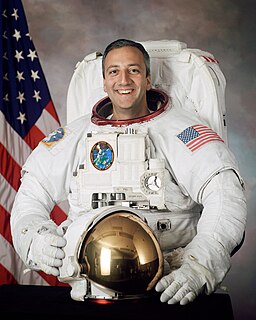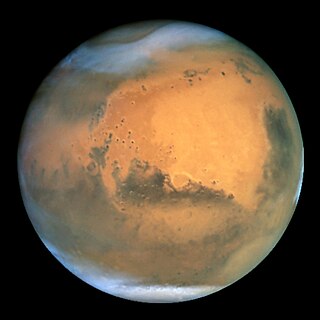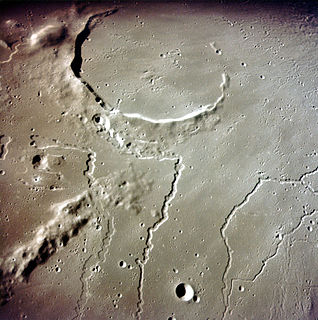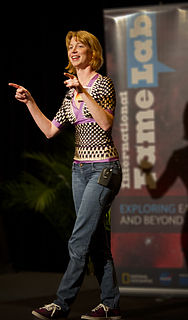Related Research Articles

The Planetary Society is an American internationally-active non-governmental nonprofit organization. It is involved in research, public outreach, and political space advocacy for engineering projects related to astronomy, planetary science, and space exploration. It was founded in 1980 by Carl Sagan, Bruce Murray, and Louis Friedman, and has about 60,000 members from more than 100 countries around the world.

Michael James Massimino is an American professor of mechanical engineering at Columbia University and a former NASA astronaut. He is the senior advisor of space programs at the Intrepid Sea, Air & Space Museum.
The Lunar and Planetary Institute (LPI) is a scientific research institute dedicated to study of the solar system, its formation, evolution, and current state. The Institute is part of the Universities Space Research Association (USRA) and is supported by the Science Mission Directorate of the National Aeronautics and Space Administration (NASA). Located at 3600 Bay Area Boulevard in Houston, Texas, the LPI maintains an extensive collection of lunar and planetary data, carries out education and public outreach programs, and offers meeting coordination and publishing services. The LPI sponsors and organizes several workshops and conferences throughout the year, including the Lunar and Planetary Science Conference (LPSC) held in March in the Houston area.

A sample-return mission is a spacecraft mission to collect and return samples from an extraterrestrial location to Earth for analysis. Sample-return missions may bring back merely atoms and molecules or a deposit of complex compounds such as loose material ("soil") and rocks. These samples may be obtained in a number of ways, such as soil and rock excavation or a collector array used for capturing particles of solar wind or cometary debris.
Doris Daou is a Lebanese-born astronomer from Canada who was formerly the Director for Education and Public Outreach of the NASA Lunar Science Institute and the Associate Director of the NASA Solar System Exploration Research Virtual Institute (SSERVI), and is currently the program contact for NASA's "Small Innovative Missions for Planetary Exploration (SIMPLEx)".

The Planetary Report is a quarterly magazine published by the Planetary Society, featuring articles and photos of Solar System exploration, planetary missions, spacefaring nations, intrepid explorers, planetary science controversies and the latest findings in space exploration and related subjects.

A flag of Mars is a flag or flag design that represents the planet Mars or that represents a fictional Martian government.

Maria T. Zuber is an American geophysicist who serves as the Vice President for Research at the Massachusetts Institute of Technology, where she also holds the position of the E. A. Griswold Professor of Geophysics in the Department of Earth, Atmospheric and Planetary Sciences. Zuber has been involved in more than half a dozen NASA planetary missions aimed at mapping the Moon, Mars, Mercury, and several asteroids. She was the principal investigator for the Gravity Recovery and Interior Laboratory (GRAIL) Mission, which was managed by NASA's Jet Propulsion Laboratory.

The Living Interplanetary Flight Experiment was an interplanetary mission developed by the Planetary Society. It consisted of sending selected microorganisms on a three-year interplanetary round-trip in a small capsule aboard the Russian Fobos-Grunt spacecraft in 2011, which was a failed sample-return mission to the Martian moon Phobos. The Fobos-Grunt mission failed to leave Earth orbit, and was destroyed.

NASA's large strategic science missions or large strategic missions, formerly known as Flagship missions or Flagship-class missions, are the costliest and most capable NASA science spacecraft. Flagship missions exist within all four divisions of NASA's Science Mission Directorate (SMD): the astrophysics, Earth science, heliophysics and planetary science divisions.
Mat Kaplan is an American radio personality. He is the host of Planetary Radio, a radio talk show about space exploration produced by The Planetary Society.
Alexander Valentinovich Zakharov is a Soviet and Russian chief scientist and astronomer serving at the Russian Space Research Institute (IKI).

Madhulika (Lika) Guhathakurta is an American Astrophysicist and scientist with NASA's Heliophysics Science Division. She was the lead program scientist for NASA's Living With a Star initiative and serves as program scientist on the Solar Dynamics Observatory (SDO), Van Allen Probes, and Solar TErrestrial Relations Observatory (STEREO) missions. Lika was previously the program scientist on SPARTAN-201, a free-flying science instrument platform designed to study velocity and acceleration of the solar wind and observe the sun's corona. These missions were conducted as part of the larger STS-56, STS-69, STS-77, STS-87, and STS-95 mission objectives. She has worked as an educator, scientist, mission designer, directed and managed science programs, and has built instruments for spacecraft. Dr. Guhathakurta is known for her work in heliophysics where she has authored over 70 publications on the subject. She served as the NASA Lead Scientist for the North American Solar eclipse of August 21, 2017.

Planetary science or, more rarely, planetology, is the scientific study of planets, moons, and planetary systems and the processes that form them. It studies objects ranging in size from micrometeoroids to gas giants, aiming to determine their composition, dynamics, formation, interrelations and history. It is a strongly interdisciplinary field, originally growing from astronomy and earth science, but which now incorporates many disciplines, including planetary geology, cosmochemistry, atmospheric science, oceanography, hydrology, theoretical planetary science, glaciology, and exoplanetology. Allied disciplines include space physics, when concerned with the effects of the Sun on the bodies of the Solar System, and astrobiology.

Yutu was a robotic lunar rover that formed part of the Chinese Chang'e 3 mission to the Moon. It was launched at 17:30 UTC on 1 December 2013, and reached the Moon's surface on 14 December 2013. The mission marks the first soft landing on the Moon since 1976 and the first rover to operate there since the Soviet Lunokhod 2 ceased operations on 11 May 1973.

Emily Stewart Lakdawalla is an American planetary geologist and Senior Editor of The Planetary Society, contributing as both a science writer and a blogger. She has also worked as a teacher and as an environmental consultant. She has performed research work in geology, Mars topography, and science communication and education. Lakdawalla is a science advocate on various social media platforms, interacting with space professionals and enthusiasts on Facebook, Google+ and Twitter. She has appeared on such media outlets as NPR, BBC and BBC America.

(Dr.) Tanya Harrison is a Planetary Scientist and Manager of Science Programs at Planet Labs, working in their federal arm with science agencies to increase research use of Planet Labs' Earth observing satellite data. Previously she was the Director of Research at Arizona State University's Space Technology and Science Initiative, and was on the science team of the Mars Opportunity and Curiosity rovers.
Sarah Hörst is an associate professor of planetary sciences at Johns Hopkins University, who focuses on understanding planetary atmospheric hazes, in particular the atmosphere of Saturn's moon Titan.

Darlene Sze Shien Lim is a NASA geobiologist and exobiologist preparing astronauts for the scientific exploration of the Moon, Deep Space and Mars. Her expertise involves Mars human analog missions, in which extreme landscapes like volcanoes and Arctic deserts serve as physical or operational substitutes for various planetary bodies. She has become a leading public figure for Mars exploration, having presented her missions publicly at academic institutions and public events around the world. She has also discussed her work for various media groups such as NPR, The New York Times, and The Washington Post.
References
- ↑ Planetary Radio Carriage Guide Archived December 30, 2010, at the Wayback Machine , The Planetary Society Web Site, retrieved 2007-01-15
- ↑ Now, More Content. "Podcasts to Listen To: Planetary Radio and the best space podcasts to listen to". The Florida Times-Union. Retrieved April 29, 2021.
- ↑ "Planetary Radio's Mat Kaplan to serve as host for SIU's eclipse festivities". SIU News. Retrieved May 14, 2021.